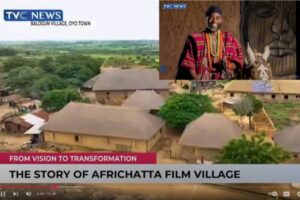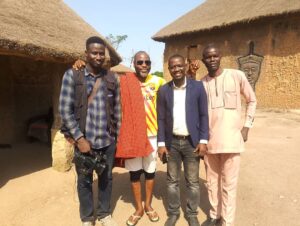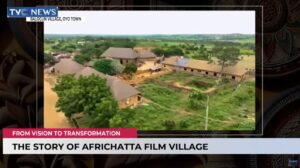From script to screen, a film project may seem like a daunting task—navigating the logistics of selecting the perfect location and assembling the right facilities to bring a story to life. But, the evolution of film villages has streamlined this process, offering a seamless experience while enhancing the socio-economic impact on host communities and the nation at large.
Ola Awakan takes us on a journey through the fascinating world of a film village that harmonizes tradition and modernity, ushering in a transformation that its people never anticipated—Africhatta Film Village.
The people of Balogun village in Oyo Town are witnessing a transformation that is reshaping their lives and their community. A development that they do not envisage in decades is giving them a facelift. How did it all begin? Filmmaking has long been recognized as a powerful tool for societal development, bridging cultures and preserving heritage.
For decades, filmmakers faced the challenge of finding the ideal locations for their productions, often traveling long distances in search of the perfect backdrop. The need for a dedicated space that caters to all film production needs gave rise to the concept of film villages. Globally, the most renowned is Hollywood.
In Nigeria, while there is no singular place known as Nollywood, numerous film villages are spread across the country. The oldest, founded by the legendary Hubert Ogunde in Ososa, Ogun State, now lies dormant. But the resurgence of film villages has become a game-changer, foiling the growth of Nigeria’s film industry, generating top-tier productions for cinemas and streaming platforms, and contributing significantly to the economy.
In 2023 alone, the movie and music industries added approximately 154 billion naira to Nigeria’s gross domestic product. Every new film village brings a wave of positive change to its host community. The journey to Africhata Film Village took me through smooth and rugged terrains, a three-hour road trip into the heart of Oyo town, where a cinematic wonderland awaits.
Veteran actor and filmmaker Ibrahim Chata has brought his vision to life with Africhatta Film Village and Resorts. Since its establishment, it has sparked a creative revolution. My curiosity about this place and its impact deepens as I approach. Majekodunmi Samson, the manager of the film village, welcomed me and offered a guided tour. Spanning over 74 acres, Africhatta Film Village is a testament to Ibrahim Chatta’s visionary prowess, not just as an actor but as a master planner behind the scenes.
The landscape is dotted with traditional houses, mud huts, grand statues and aesthetic elements that transport visitors into a world of storytelling. Even the animals there, particularly the horses and donkeys, have become integral to many blockbuster movies. When you enter the Africhatta Film Village and resorts, one striking thing is the ancient structures. But beyond the ancient buildings are modernized interiors.
That makes this film village serve a dual purpose: the purpose of shooting epic movies, as well as providing luxury. Before meeting the man behind this vision, I took time to explore the various sections of the village with Mr. Majekodunmi. Several award-winning films have been shot here, bringing Ibrahim Chata’s unique dream to fruition.
According to the manager of the film village, “all the villages we find in Lisabi, are these buildings here. They were shot here. Then we have the market space here, too. This is the market that was used in Lisabi. Then you can see our horses, this is where we have them.” Africhata Film Village is more than a film set; it is a living, breathing artistic home. Its lush green landscapes, pristine air, and traditional aesthetics make it an irresistible attraction for tourists from far and wide.
Meeting Ibrahim Chatta in person, his humility is striking. Many filmmakers of his stature exude an air of grandeur, but his down-to-earth nature is refreshing. As a versatile actor with a deep love for horses, he has built an equestrian haven. He is the only Nigerian filmmaker with the largest number of horses in one location, perhaps even in Africa.

Majedodunmi admitted that the horses have been working since the inception of the film village. “They have been working, from Lisabi. After Lisabi, we shot Iyalode by Toyin Aimaku, then we shot Labake Olododo by Iyabo Ojo, and ever since then, they have been walking, they have been acting.”
Ibrahim Chatta whose father is from Tapa in Niger State and mother from Kwara State had his passion for filmmaking ignited as a child actor under the tutelage of the legendary Hubert Ogunde. His journey into this capital-intensive venture was driven by the desire to solve industry challenges.
He told me that he is the kind of person who enjoys telling traditional stories, talking about the culture of Africans. “Having that in mind, I discovered that most of the places we use for locations are being renovated when their children go to a big city like Ibadan and Lagos. When they come home, they rebuild their father’s houses, making us not have spaces for our traditional films again.”
“So, I said, okay, what if I now create a space to suit that? That way, I will be solving some of my colleagues’ problems, at the same time earning money for myself. So that’s the story”, he added.
Balogun village was not initially his planned location, but unforeseen circumstances led to its selection, turning it into a blessing in disguise.
His vision seamlessly blends tradition with luxury, creating a unique cinematic environment. “So, we have two kinds of settings here. We have those places where you see the interior and exterior, which means those places are basically for filming both the interior and exterior. So, there are places you see the exterior, but you are not going to see the interior. There are many things in here that you cannot see when you are watching the film. So, we want to still retain the originality of our cultural settings, at the same time, have what we can have in the cities” Chatta said.
 He believes that the rise of film villages signals a bright future for Nigerian filmmaking. “What about if you have your own film village? I have mine, Samson has his, and he is coming to me to book for his film. And I take all the money, get him the things I can get him here, come to your space and rent, pay you, so that when they leave my space, they will come to your space as well and do things. There can be some things you have there that I do not have here. It’s win-win for all of us”, he admitted.
He believes that the rise of film villages signals a bright future for Nigerian filmmaking. “What about if you have your own film village? I have mine, Samson has his, and he is coming to me to book for his film. And I take all the money, get him the things I can get him here, come to your space and rent, pay you, so that when they leave my space, they will come to your space as well and do things. There can be some things you have there that I do not have here. It’s win-win for all of us”, he admitted.
Ibrahim Chata’s journey in the industry has been far from smooth. He told me how at one time he was not earning money. “The periods that we were hungry, I worked as a bus conductor for over eight years, I hawked ice cream and popcorn, and all that. I just knew it was going to be good. I’m a believer. I am a very strong believer. So, I pray to God and hope for the best. That has always been my system since I was a little boy. I started very early. I didn’t go to school because of this. I squandered the opportunity to go to school. I just want to be a better person and I want Allah to forgive me before I die. Now, I think about death every day. Before, I couldn’t feed myself. Now I can feed myself, feed my family, feed the people around me”.
“I am not a wealthy person. Every day I go broke. If I take 10 million now, before tomorrow morning, I will have finished it. To maintain this place is very, very expensive.” He lamented.
When I entered his residence, I witnessed another dimension, an elegant interior and an impressive display of awards, offering a glimpse of a modern city within a rustic setting. According to him, “Because I live in the bush now, I want to be here and get whatever I want”. He showed me around his room as he confessed that he has invested over 100 million on artworks. “I am a lover of art as well. We are creating our own art gallery from works of prominent artists, sculptors, carvers, painters, oil on canvas, and acrylic on canvas. I’ve done well over 1.4 billion naira in this film village. Go around. We have lands”.
He explained to me how funding remains a major challenge, despite his achievements.
VILLAGERS’ TESTIMONIES
I also spoke with some of the village residents who have been directly impacted by this transformation. From Ojedele Titilayo, a casual worker, to Samuel Olajide, the son of the village’s first head, the consensus is clear- Africhata film village is a blessing.
Olajide said, “we appreciate him for what he has done. Commercial activities have been going smoothly for both indigenes and visitors. My father prophesied before he died that a visitor would come to transform this village. I want to appreciate him for what he has done for us. he created sources of income for us”
“When this place was opened, I got employed and my life was transformed. we cook for at least 50 people every day”, Titilayo buttressed.
The head of the village, Oladejo Ologunde, shares his gratitude for the opportunities this initiative has brought. “He has brought development to this village by engaging most of our youths who are artisans. Since its inception, he has helped this community a lot. The economic activity has boomed. He has helped the name of this community to go far, even more than we expected”. Kadiru Afolade, the village youth leader, describes the immense benefits for young people in the community.

HOW THE GOVERNMENT ENDORSED THE FILM VILLAGE
After my first visit to the Africhattafim village in Balogun village, Oyo town, my next stop was Ibadan. I learnt that the Commissioner for Information and Tourism had recently visited the village and I was eager to have a conversation with him about the government’s assessment of this emerging tourist destination in the state. Dr. Wasiu Olatunbosun welcomed me into his office, radiating excitement about the development. He emphasized the state government’s commitment to fostering an enabling environment and providing support for investors.
“To have Ibrahim Chatta’s, Africhata film village here in Oyo state, being operational during our time, is a good development. It is not the only one. We also have Kunle Afolayan, but that of Africhata film village is massive and the concept can measure with any international standard.”
He shared his observations from his visit to the village, highlighting how the founder has shown a deep commitment to the community’s growth and development.
“He requested that the community primary school, in that place, that they don’t have teachers, that if all the pupils in that community will have to go as far to Oyo, so you know the cost implication. And by so doing, the majority of them drop out. He is thinking that the government could just help them to fix that school, and I said no problem.”
“And I have met with the SUBEB Chairman, they are going to fix teachers there and monitor them.”, the Commissioner responded.
MY SECOND VISIT TO AFRICHATTA FILM VILLAGE
I knew that a single visit would not be enough to truly capture the essence and progress of the film village. Determined to see more, I embarked on a second journey from Lagos to Africhatta to validate the commissioner’s insights first-hand. Finding Africhatta has now become much easier. In just a few weeks, more structures have sprung up. I met tourists who had travelled with their families to explore this new wonderland in Oyo town.
Curious about what drew visitors here, I engaged them in conversation. Some had come from Kano, Abuja, and other distant places, all sharing a common sentiment that Africhatta film village is a vital hub for preserving Yoruba culture.
Adekunle Adeoye, one of the tourists, said, “Africhata is an institution that has brought so much entertainment and education to the Nigerian screen. And we feel that since we have such institutions at our backyard, it is a normal thing for us to come and witness the magic that has been created here. So that is why we are here.” For Olaoye Olajide, her experience was really an amazing one. “I have seen a lot. It actually brings about the heritage of Yoruba land.”, she said.
Oluwatosin Adekanbi buttressed by admitting that the experience was a fulfilling one for his family. “This was a community where we were born and raised. And we could not even imagine in the next 100 years, someone of Ibrahim Chata’s caliber can actually dream of coming and building something of this in this environment”.

Back to the vision carrier, Ibrahim Chatta took me on an extended tour of the village, explaining the original concept behind its design. To my surprise, he was also the mastermind behind the architectural master plan. He led me to the newly constructed swimming pool, hinting at even more modern structures and set to be built in the near future. He said plans are ongoing to create 20 swimming pools inside the film village for tourists to feel comfortable.
“I don’t know when I am going to get money for it. I pray I get money. I pray, I pray I get help. There are some things that will come here that is not yet here, but already designed. I drew everything, everything, every single thing on the ground myself, including the pool. I designed, I marked”, he said.
One of the unique experiences at AfriChatta is horse riding. Any visitor interested in riding a horse is welcome to do so. Before trying it myself, I decided to speak with the man responsible for managing the horses. Mohamed Dahiru initially planned to stay for just one month, but has remained far longer. He revealed that Ibrahim Chatta owns the largest number of horses at a single location, second only to the Emir of Gombe.
He told me how more than 40 of Ibrahim Chatta’s horses died. “I think almost 42 or 40 of Ibrahim Chatta horses died”. I then inquired to know the number of the remaining horses in the village. “So, how many do we have left now?”
“We have 21. With four donkeys and one camel”, he responded. “For me, I can say there is only one Emir that I know, Gombe State Emir, who has plenty of horses like this. Because most of the Emirs, when they buy the horses, they used to share them to people who would be taking care of them, because they cannot keep it like this and feed them because it is not easy. Try it for medication, for their food.” He added. He also explained that it is very expensive to feed the horses daily. I also rode a horse and the experience was nothing short of exhilarating.
Beyond the entertainment and tourism aspects, the film village has had a tangible impact on the local community. One notable initiative is the planned revamping of the only school in Balogun village, a course championed by Ibrahim Chatta. To reach the school, I walked along the cassava plantation path within the film village. The school consisted of an isolated block with three classrooms but only one remained functional while the other two had been neglected for years. In addition to fixing the school, Ibrahim Chatta has also launched the Light Up Balogun Village Project, a development that the villagers will be forever grateful for.





